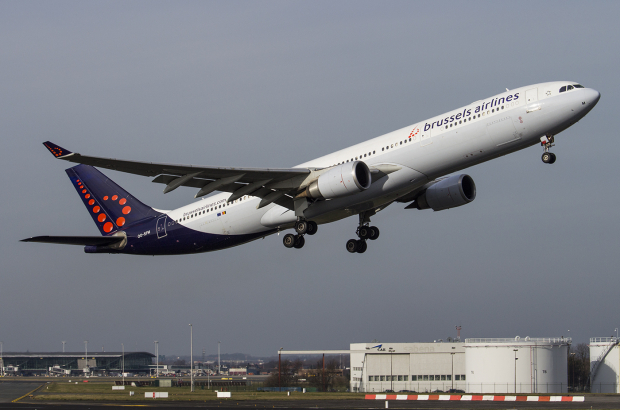- Daily & Weekly newsletters
- Buy & download The Bulletin
- Comment on our articles
'Ghost flights': why are so many empty airplanes still taking off?
Thousands of empty or near-empty airplanes have made landings at major airports across Europe, and thousands more will do the same before winter is over. The reason? European regulations.
In order for an airline to keep its “slots” - time slots that allow them to take off from or land at an airport at a specific time - they must normally carry out at least 80% of their scheduled flights. This was reduced to 50% due to the coronavirus pandemic.
This means that even if no one is onboard, airlines risk losing their rights to operate if the plane doesn’t show up where it's scheduled to be, passengers or no passengers.
But critics are calling these regulations from the European Commission economic and ecological nonsense in the midst of a pandemic, when travel is restricted in order to contain the spread of Covid-19.
“I have written to the European Commission to relax the rules at least for the time of Covid and to accept that companies do not fly for nothing to keep their rights to land and take off at the main airports, because this does not make sense,” Belgian mobility minister Georges Gilkinet (Ecolo) said.
Brussels Airlines is asking for the rules to be relaxed. A spokeswoman said: "We are currently seeing a sharp drop in bookings, especially at European destinations where there is normally a lot of business traffic. But we also know that those flights will pick up again as soon as possible. That's why we definitely want to keep those slots."
A long-standing rule
The “slots rule” came about in the 1990s as a means to ensure airport efficiency and organise air traffic, Waldo Cerdan, a former airline pilot, explained to RTBF.
“We allocate and organise ourselves in such a way that as many companies or planes as possible can come to the airport without creating a bottleneck,” Cerdan said.
“Inevitably, there are more people who want to come than there are places available. So there is competition between the companies for slots. They’re precious.”
The allocation of slots is examined by an authority in each country every year, with discussions involving the airlines and the airports. Airlines can argue their right to keep existing slots and make claims for new ones according to certain allocation criteria.
“Europe issued a regulation in the early 1990s to increase efficiency and oblige airlines to use at least 80% of the slots they own,” Cerdan said. “The reason for this is to avoid blocking positions and thus preventing competitors from coming in.”
If there are slots left at an airport that are not being used, they can be given to other airlines, either those already operating at the airport or others that would like to get a foothold there.
A valuable and rare commodity
Slots are a valuable and increasingly rare commodity, especially at the busiest airports in destinations like Brussels, Paris or Frankfurt where there are often more applicants than there are available times.
When Sabena, the national airline of Belgium from 1923 to 2001, went bankrupt, the slots it owned at London airports were sold off. “Everyone wanted to go to London and it was a lot of money,” Cerdan said.
When Brussels Airlines was created out of the ashes of Sabena, its management wanted to keep the treasured slots Sabena had in Africa, which even today remain a strong selling point. The slots Brussels Airlines had were part of what made Lufthansa interested in assuming ownership of the company.
Some airlines trade slots, and in some countries or airports, they can also sell them. The price isn’t cheap: in London, for example, Air France-KLM sold a pair of slots to Oman Air for $75 million in 2016.
The value of a slot varies according to supply and demand, along with rarity. “It's an asset that companies have and want to keep. Without slots, we can't do business,” Cerdan said.
Adapting to the pandemic
But now that the pandemic has dampened travel and the effects of climate change are becoming more and more pronounced, critics question the flight completion threshold for maintaining ownership of a slot.
“If we look at the 18,000 flights that the Lufthansa group will have to operate empty, 18,000 intra-European flights emit about 700,000 tonnes of CO2,” said Noé Lecocq, climate expert at Inter Environnement Wallonie.
“These 700,000 tonnes of CO2 will cause, if we follow the historical trend, the definitive disappearance of two million square metres of additional Arctic ice pack.”
Not forcing airlines to make these empty flights would be a “plus” for the planet, Lecocq says, even if “these flights would have taken place in the normal way with passengers if the health situation was not as it is and the pollution would have been the same.”
During the first wave of the pandemic, the European Commission lowered the threshold for an airline to keep its slots to 50% of flights.
Those concerned with the environmental implications of empty flights are asking them to do the same again now, and others point to economic reasons for the change.
“[The current pandemic situation] shows the limits of the system,” Cerdan said, “because if we want to respect this rule, which makes sense in itself, we burden the companies with additional costs.”




















Comments
It's quite a scandal from an ecological perspective. Would be good to confront the Commission with the situation. They behave as if they are not the main actor, but a spectator. Everybody sees the environmental damage - the Commission seems to ignore it.